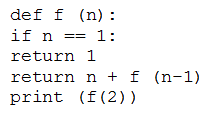What is the expected output of the following code?

What is the expected output of the following code?

The function f(n) is designed to be a recursive function that sums the integers from n down to 1. However, the code has a key issue with indentation. In Python, proper indentation is crucial for defining the scope of code blocks. The second return statement is indented as part of the if-condition, meaning it will never be executed if the condition `n == 1` is true. After returning 1 for `f(1)`, the function would effectively have no return when n is not 1, resulting in the function returning None for any other value, including f(2). Without proper indentation ensuring the second return statement executes outside of the if-condition, the output is None.
C assuming the indentation is correct (there's no option for "the code causes runtime error", so I guess the indentation is correct)
Another example of where blind copy and paste makes this questions boarderline unanswerable.
Its not properly indented so it should return errors but since that is not an option then the answer is C if indentation is assumed to be correct
The answer is C if the indentation is assumed to be correct.
This is the correct code that prints 3 as the answers def f (n): if n == 1: return 1 else: return n + f (n-1) print (f(2))
Throw that code as-is and what are the results? D is the correct answer.
error based on indentation??
answer should be C if identation is correct
The answer in this case is None as there is no "else" specified, so that works only when n==1
It's a recursive function that adds up all the numbers from n, n-1, n-2 ,...,1. So, given n=2, and assuming the indentation is correct, the result will be: 2 + 1 = 3.
when you run this snippet on a compiler it prints out None. Even if the indentation is corrected you can not have 2 results in one function unless it is separated by an else like below def get_absolute_value(num): if num < 0: return -num else: return num result = get_absolute_value(-5) print(result) # Output: 5
D is correct
The answer to the problem is 3
The answer is None def f(n): if n == 1: return 1 return n + f(n-1) print(f(2)) test the code and result = None because dont have Else: on if
def f(n): if n == 1: return 1 return n + f(n-1) print(f(2)) Answer will be 3 ------------------------------------ def f(n): if n == 1: return 1 return n + f(n-1) Answer will be None
executed and verified
There is no need for an else, if n != 1 it will return the n + f (n-1) So correct answer is 3